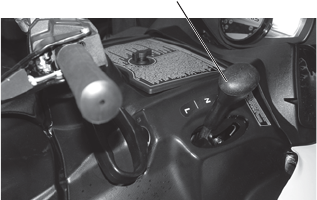
73
OPERATION
Daily Storage
At the end of each ride, park the snowmobile on a level surface and sup-
port it at the rear with an appropriate track stand. The track should be
suspended approximately 4" (10 cm) off the ground.
Remove the key and cover the snowmobile.
Towing
For your safety, do not attempt to use a tow hitch until you've read the
following warnings and understand the proper hitch functions.
WARNING! Objects towed with a rope have no braking power and can easily
collide with the rear of the snowmobile or other objects, resulting in serious
injury or death. DO NOT tow toboggans, sleds, saucers, or any type of vehicle
with a rope. Only a stiff metal pole connecting the towed object and the tow hitch
on the snowmobile should be used. If passengers are to be towed on a
toboggan or sled, make sure the pole is at least four feet (1.2 meters) long to
prevent any possibility of contact between the snowmobile's track and a person
riding in the towed object. Braking distances increase when towing loads. Slow
down to maintain control of the snowmobile.
Whenever towing or operating with a heavy load, place the transmission
in low gear. Towing in high gear can result in belt damage. When oper-
ating in low gear, vehicle speed will be limited to protect the drive train.
If the snowmobile becomes
inoperable and must be towed,
and if it isn't possible to use a
rigid tow bar, attach the tow rope
to the ski spindles (not to the ski
loops) to prevent damage to the
steering components. Place the
transmission in neutral, and have
someone ride on the towed
snowmobile to operate the brake
and steering when necessary.
NOTICE: Towing a disabled snowmobile with the transmission in gear can result
in serious damage to the engine and drive system. Always place the
transmission of the disabled snowmobile in neutral before towing.
Shifter


















